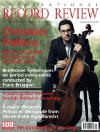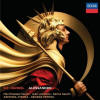Texte paru dans: / Appeared in:
*

International Record Review - (01/2013)
Pour
s'abonner / Subscription information
Decca
4784699

0028947846994 (ID250)
Consultez toutes les évaluations recensées pour ce cd
~~~~ Reach all the evaluations located for this CD
The renaissance of Handel’s once neglected Italian opera on record in the 28 years since the composer’s tercentenary in 1985 would have astonished the late Stanley Sadie, whose contribution to Alan Blyth’s Opera on Record was a survey of 13 recordings, only two or three of them which he could recommend as stylish representations of the works as Handel wrote them. One of those was Sigiswald Kuijken’s Alessandro, which has remained virtually unchallenged — a coarsely sung, ponderously conducted Polish performance proved no competition at all and soon found its way onto my rejects pile — for the best part of three decades. Sadie would doubtless have been as dumbfounded as I am that Alessandro, of all pieces, should come into the London bus category — you don’t see one for ages and then two come along at once. I wrote at length about Michael Form’s live recording from the Karlsruhe Handel Festival, little suspecting that another was on the way from Decca under the direction of George Petrou, whose Handel opera and pasticcio recordings from Dabringhaus und Grimm have recently been some of my most rewarding listening experiences , notwithstanding a few undercastings and the odd interpretative eccentricity (I won’t forget or forgive the laborious meal he and his Cleopatra made of the sublime ‘Se pietà’ and ‘Piangerô’ in their Giulio Cesare, reviewed in June 2010).
For Alessandro, Petrou seems to have had a change of heart about his preference for mezzo-sopranos rather than countertenors in the castrato roles. Indeed, his conversion seems bordering on zealotry here, as he even casts the secondary role of Cleone — one of the generals conspiring to overthrow and murder Alexander the Great — to the remarkable Russian male alto Vasily Khoroshev, even though it was written for a woman (Anna Dotti, the first Eduige in Rodelinda and Irene in Tamerlano) . The two castrato roles, Alessandro (Alexander the Great) and Tassile (Taxilis, King of India and ostensibly Alexander’s rival for the love of one of the two prima donnas, Lisaura) are taken, respectively, and magnificently, by the Austrian Max Emanuel Cencic and the Catalan Xavier Sabata. Long gone are the days, it seems, when English falsettists were the dominant forces in this repertoire (indeed no British countertenor features in the discography for complete Alessandros).
In my review of the Karlsruhe set, I noted Winton Dean’s disparagement, along with most of the operas Handel wrote for the ‘rival queens’ Cuzzoni and Faustina, of the dramatic imbalance of this opera. Essentially, this is a three-person show: the love triangle Alessandro-Rossane-Lisaura, with cameo parts for a secondary trio of singers. Each of the principals has more arias than the roles of Tassile, Cleone, Leonato (tenor Juan Sancho) and Clito (bass In-Sung Sim) combined, although both the Indian King and the high voiced general, Cleone, have potentially show-stopping numbers, dazzlingly delivered, at Petrou’s presto (almost) impossible tempos, here.
Despite Dean’s strictures about Alessandro’s dramatic shortcomings, it makes for a thrilling experience on disc, especially in this performance, which I rank not only the best of all Alessandros but one of the most exciting Handel recordings on disc. Cencic has done nothing better than his grand assumption of the title role in the studio. From the spectacular opening, as Alexander’ s forces storm the walls of the Indian citadel, Oxidraca, Cencic establishes the titular hero’s ‘superbia’ — Handel’s librettist, Rolli, drew his text from Steffani’s 1690 Hanover opera La superbia d’Alessandro — with his opening accompagnato, interrupted by two ‘battaglia’ sinfonias , one representing the destruction of Oxidraca’s walls. One can easily imagine a more spectacular opening coup de théâtre than could be achieved onstage, and it is a tribute to Petrou’s musical direction that he gives Alessandro all the theatrical thrills and spills one can reasonably expect in an audio-only production. Certainly he tests his casts with expansive — though here not ponderous — tempos for slow, lamenting arias and bravura numbers taken at dizzying speeds: his Act 2 showpieces, ‘Vano amor’ (‘Vain love’) and ‘Risolvo abbandonar la bella’ (‘I will abandon the beauty who spurns me’), are dispatched at high velocity with astonishing technical élan, evoking Quantz’s description of Senesino’s ‘divisions from the chest’. I don’t think I have heard countertenor coloratura to equal this, but it is almost matched by Sabata’s Tassile in ‘Sempre fido e disprezzato’ (‘Always faithful, yet rejected’). The singing is so exhilarating that you’ll want to encore these arias as soon as they are finished.
The same is true of the glorious young Julia Lezhneva as Rossane . This was the debut role of Handel’s new discovery from Venice, Faustina Bordoni, and it is clear that even though he may have tried to keep his other prima donna Cuzzoni happy, he must have been entranced by the newcomer, reputedly a beauty in marked contrast to her squat, matronly rival with her ‘doughy, cross face’. This very young Russian soprano — not yet 25 — first came to my attention in Giovanni Antonini’s Naïve set of Vivaldi’s Ottone in Villa — in which she managed to outshine old stagers such as Sonia Prina, Veronica Cangemi and Roberta Invernizzi — since when she has made a slightly disappointing (premature) Rossini solo album for the same label under Marc Minkowski (reviewed in February and April 2011 respectively), and is now a new Decca signing (one prays it will handle her with care). Here she establishes herself as a Handel soprano — or mezzo, it’s hard to tell — and Baroque stylist of the first order: the timbre is limpid, youthful, perhaps, if one is being hypercritical, a bit ‘white’, but she shows what an expressive singer she is in the wonderful accompagnato and arioso sequence that opens Act 2 , ‘ Solitudine amate . . . Aure, fonti’ (‘Beloved solitude . . . Breezes, fountains’) which is one of Handel’s great outpourings of wonderment in nature, comparable in its way to Ilia’s ravishing ‘ Solitudine amiche . . . Zeffiretti lusinghieri ‘ at the opening of Act 3 in Mozart’s Idomeneo. Lezhneva makes the same impression as the young Cecilia Bartoli here, although their voices do not sound remotely alike. For a non-Italian, her text is uncommonly clear and reasonably idiomatic, and like Cencic she trips, bewitchingly, through acres of coloratura as if they were child’s play. For Lezhneva’s performance alone, this is a must-hear for anyone who loves Handel (or Baroque vocal music in general).
Inevitably, perhaps, Karina Gauvin’s Lisaura is cast into the shade , but that’s partly Handel’s fault, for one could hardly ask for a more brightly, teasingly characterful account of this role, a woman who seems all too aware that Alessandro is interested in her only for political reasons and sufficiently happy to accept Tassile’s hand as her consolation prize . In duet — a trick Handel never repeated, because of the burgeoning rivalry and animosity of Faustina and Cuzzoni — they are enchanting, and it is good to have their lovely final ‘duetto a tre’ with Cencic’s Alessandro, inexplicably cut in the Karlsruhe version. Despite the wonderful singing here, it is Petrou and his remarkable period-band Armonia Atenea who take the laurels here. The conducting and playing are volatile, temperamental, expansive, always attuned to the theatrical effects Handel and his librettist attempt to make within the confines of their star singers’ showpiece expectations.
I haven’t enjoyed a Handel opera on record
as much as this in years. Let’s hope Decca has more plans for Petrou,
Lezhneva and Cencic in this repertoire in the near future, but next time,
can we have the libretto, cast details and notes in one booklet, please,
rather than split between two, which makes for awkward cross-referencing?
Cliquez l'un ou l'autre
bouton pour découvrir bien d'autres critiques de CD
Click either button for many other reviews


